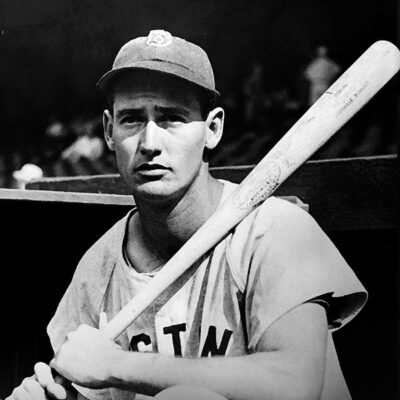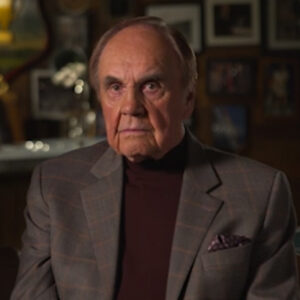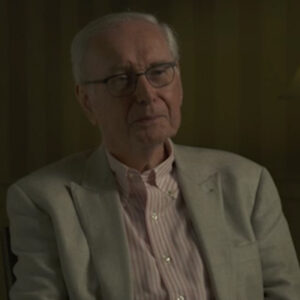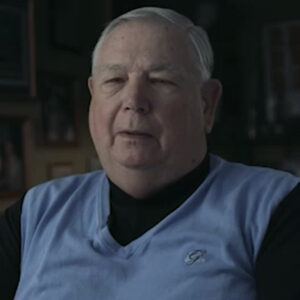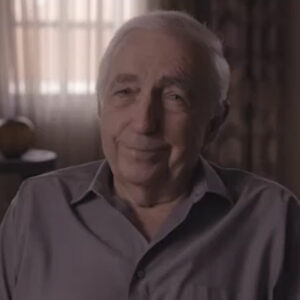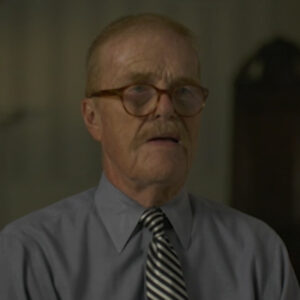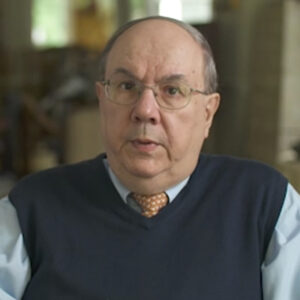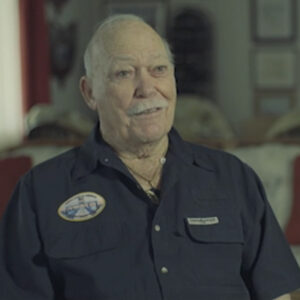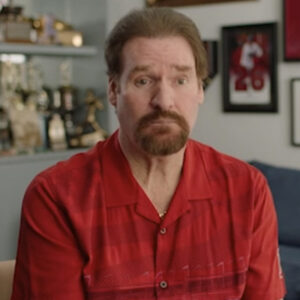Speaker 1 Ted Williams had the gift of an unhappy childhood like so many creative, great individuals, and he was lonely and he decided that he was going to invent himself and he became the greatest hitter who ever lived because that’s who he wanted to be. And I think Ted is a beacon for all unhappy children and that you can define yourself, you can be who you want to be. And in the end, you could be great.
Speaker 2 Fantastic. I was actually looking just to sort of reiterate that first thing again from great from the thirty five thousand foot view. What an interesting character.
Speaker 1 I could see Ted Williams in Red River, I could see him riding a horse, I could see him snarling his way through an action film, Ted was heroic in his every stance. And the more he withdrew from the public, the more the public loved him. The sportswriters hated him, unlike DiMaggio, who also withdrew. But the sportswriters created a legend about what a wonderful guy he was. Williams was perhaps a more wonderful guy than DiMaggio, but couldn’t catch a break.
Speaker 2 That’s so interesting. What do you mean compare it with compare the two of them when
Speaker 1 when Ted came in the Boston Red Sox in 1939, he was a beanpole of a kid. He was six foot three. He was 170 pounds, 180 maybe in later years, and he would practice his swings while standing in the outfield. He was regarded as a nut. And the comparisons that were made between Williams and prior great players were not to Babe Ruth, who had recently retired, but to Babe Hermann, who never quite got his head into the game and was regarded as utterly zany. Williams was criticized after the 1941 season. I believe it was for not going back to San Diego to see his mother and study gone fishing to Minnesota. And he had a girl, Doris, and what the press put
Speaker 2 it out there,
Speaker 1 what kind of guy doesn’t come home to see his mother? Dave Egan was a special nemesis of Williams, but there were others and he lost MVP balloting. He lost Williams lost in the Most Valuable Player award balloting twice when he deserved the award because Boston writers wouldn’t even give him a 10th place vote. So what explains his war with the press? That he decided they were against him so he wasn’t going to care about them and they gave it to him back a shellacking. Year after year after year, so that even when Williams went off to Korea and they gave him a day and they gave him a car, some writer, I think it was Egan again who said, why are they giving a day for a guy like this? Williams was an enigma, but every fan loved him, all of his teammates loved him. He was a guy’s guy, a man’s man, and. If you’re going to model your conduct on the field. After another ballplayer, you could do a lot worse than Ted Williams, who, of course, there was the expectorate Great Expectations incident where he spit at the toward the stands, probably thinking he was spitting at some writer. But it was it was a bad incident. Williams.
Speaker 2 Let me stop you there and just let us get back what how would you see moving around? Sorry, I just want to.
Unidentified We’re taking all of this. If we have any
Speaker 2 good,
Speaker 1 we like to make people happy.
Speaker 2 How would you compare him to DiMaggio? I mean, they were compared all the time.
Speaker 1 Williams and DiMaggio played different positions, DiMaggio was an outstanding outfielder, played centerfield, resented those few games when he moved to either corner. Casey Stengel moved him, I think, to right in order to play Mantle in center. And DiMaggio hated Stengel forever. For that. He may have hated Stengel for any number of reasons. After 1949 to Williams was the greater player, the greater the greater the greater hitter, the greater teammate. DiMaggio was aloof. With everyone. Williams was selectively aloof. If you were in the club, if he liked you. Then you were in forever. If you are out, well, the door said keep out and he meant it. Between DiMaggio and Williams. Every contemporary writer thought DiMaggio, the greater player, and Williams merely a hitter, but Williams was quite a good outfielder for many years. It was only in his last years when no designated hitter position was available to him that he had to go out in left field and was grateful that Fenway had a short left field, less ground to cover anyway, because very expert at fielding balls that were coming at him off the wall.
Speaker 2 But why why did people I mean, just one final whack at like DiMaggio in the public eye and sort of the myth of Joe DiMaggio and the sort of character that was created to be Joe DiMaggio versus what seemed like Chamberlain to really create a character who was just Ted Williams. Is that right?
Speaker 1 It’s largely right. It’s also in New York, Boston thing, the the New York press corps or superior press agents to the Boston Press Corps and the Boston Press Corps didn’t like Williams, so they were no help to him. And the writers adored DiMaggio, the New York loved hero stories. Now, you could have made a hero of Ted in Boston if the writers had so chosen, but their personal animus got in the way.
Speaker 2 Right, so let’s talk about his childhood. What was his mother like?
Speaker 1 Ted’s mother may love the Salvation Army and liked her kids and that pecking order rules so that Ted would. Find himself coming home after school with nobody there,
Speaker 2 hey, I’m sorry. Hey, you go. Come on, buddy.
Speaker 1 What’s he doing?
Speaker 2 He’s in the shot, his claws. And he told me he was in danger of know, you know,
Speaker 3 deep
Speaker 2 down. They’re down or. Right. Let’s see if he if he settles, he doesn’t want to take him out. Yeah, I think so, yeah. Yeah. OK.
Speaker 1 So you want to go there with that question again? Yeah.
Speaker 2 Me Eventer or MAVEN’s or whether
Speaker 1 it may Venger Williams. Love the Salvation Army and only liked your kids, and that was evident in the time devoted so that when Danny and Ted would come back from school and find nobody at home, they would sit on the porch or wait. Or in Ted’s case, he went to the North Street playground, which was a block and a half away, and became his second home. I think Ted’s lack of maternal care. The indifference of his father and mother, both to anything except the contract that he signed with San Diego in 1936. I don’t believe either of them ever saw Ted play baseball and May lived until Ted retired a couple of years after, maybe she died in 61. This kind of neglect can be characterized as abuse, it’s not benign, it was harmful. But it was a gift, it’s a gift for the great if you get an unhappy childhood in your basket, you have a choice as to what to do with it. Not everybody can make that choice. Some people get tangled up in what they fail to receive as a child and spend the rest of their life looking for it in other quarters. In some measure, that may be true of Ted emotionally. But it drove him to performance and achievement can be an emotional reward.
Speaker 2 What about anger and hit?
Speaker 1 Anger. Or intensity, and those are parallel but not identical terms, and I prefer intensity. I think Ted had the ability to tie flies with intensity. I think he had the ability to manage with intensity. I think he had the ability to hit with intensity. I think he had the ability to relax with intensity. There was only one year for Ted and this is what made him great. But that’s also what made him so difficult for others to fathom, to find an entry point into who he was.
Speaker 2 Is there something about the act of focused attention, intense hitting of a baseball that is an outlet for rage?
Speaker 1 Oddly, I think that the more intense you are at the plate, the more poorly you will perform intensity in your approach to the game, intensity to your approach to the batter’s box. Well, that’s great. But if you’re playing at an intense level while you’re in the batter’s box, my guess is that this may detract from your attention. Who are the great intense players? Jackie Robinson, Ty Cobb. You think of these as unrelenting. Drive. I believe that Williams was not merely intense, he was also a technician. I think he was he approached hitting with the surgeon’s care and he had discipline that you would not associate with anger. So I think he left his anger outside the batter’s box,
Speaker 2 but he did say that he hit better when he was
Speaker 1 angry. People will say things, people will say things, and one may believe them or not. And in retrospect, one can say, I was so angry with the way the manager handled this situation that I went up to the batter’s box in a fury and I hit three home runs. This ex post facto mythologising is generally the province of sportswriters, but ballplayers do it to
Speaker 2 when we were talking before we began rolling, you described me physically. You just tell me what you would like me.
Speaker 1 It was a smallish woman from all I could make of the photographs and had a narrow face. So Ted certainly got some physical features. His father, who was a sometime photographer and largely ne’er do well, also doesn’t look a lot like Ted. So he is the man who not only invented himself temperamentally, he appears to have invented himself physically.
Speaker 2 Is it true that his brother looked rather.
Speaker 1 I’ve never seen a photo of Danny, so I can’t say.
Speaker 2 It is said that. Head to head looked like Danny, it would have been much harder to conceal the fact that it had Mexican heritage.
Speaker 1 Well, there is a question that’s frequently posed on trivia boards, and that’s who is the greatest of all Hispanic players and everyone will answer. Roberto Clemente or one Marisol and a perfectly good answer as Ted Williams.
Speaker 2 That’s great. The why did he what was why did you consider the fact that he was Mexican?
Speaker 1 I don’t know that Ted concealed the fact that he was Mexican so much as it was immaterial to him. I think all references to his parentage and to his brother Danny were really off limits to the press and perhaps off limits to his cogitating process. I think he was not thinking about them after they made it clear that they had their own agendas apart from him.
Speaker 2 Right. What was it like when Ted Williams came to that? What was it like in the ballpark?
Speaker 1 Williams looked different for most players, and he approached the batter’s box slowly and he stood straight until he coiled. But it was not a severe coil like Stan Musial, it was not a crouch. He or he was swinging all out all the time. There was no measured response. There was no idea of going with the pitch, hitting the left. He was. A model of a swing that no one had seen since Joe Jackson and no one had emulated. In baseball until Mickey Mantle now, Mantle was unaware that Joe Jackson was the primal all out swing, Eddie Collins, when he scouted Ted Williams in San Diego in 1936, was shocked to see Joe Jackson swing. And he said instantly to Bill Lane, the owner of the Padres, or the missions, as I believe they may have been called over. No, no, they were the Padres, Eddie Collins said to Bill Lane. I know I’ve got an option on these two players, but give me a year. Williams And in the end, he took Williams and let George Myatt go to another club and. Only someone like Heidi Collins, who had seen Joe Jackson in his prime, who had been his teammate, who had been in the major leagues before Jackson could have that kind of an approach. I mean, I remember Buck O’Neil in the Ken Burns baseball, Phil. Talking about Bo Jackson and the sound that came off of the ball coming off the bat and he’d only heard that sound. With Josh Gibson and I forget who the other guy was, but he hadn’t heard it in years. Williams had that sound and. It was an amazingly fluid full swing, the arc of the swing was tremendous, if you look today at the Dodgers first baseman Bellinger, which was a very large arc on his swing. But it is it is not a fluid swing. It is. An angry, intense swing of precisely the sort that Williams did not exhibit. Williams, his swing was almost leisurely in its arc and intensely damaging.
Speaker 2 That’s great, um, well, you know, he wrote this book, The Science of It, was he I mean, how did he approach hitting?
Speaker 1 Williams learned early on that there were areas of the strike zone, not merely balls off the plate in which he could not perform at the level he wished. So he became incredibly selective. And for this, he was criticized in the Boston papers his whole life. Why won’t this guy nibble with men on base? If there are men on second and third, why will he take a walk and leave it to the next guy to clean up the bases? Williams was not going to alter the arc of his swing and the mission with which he came to the plate. In order to please sportswriter’s. So he was not a situational hitter. You had you could pitch around Ted Williams, but if you made a mistake in the strike zone, it was at your peril.
Speaker 2 Um, did he study any?
Speaker 1 I don’t know that Ted studied any other Whitter. I think the swing was natural. I think the swing is the product of his being six foot three and one hundred forty eight pounds as a 17 year old rookie with San Diego. He had to swing big for the ball to go anywhere. And he was determined that he was going to be a big hitter. He was not going to be a place hitter. He was not going to be an Eddie Collins. He was not going to be a Ty Cobb. He was not going to be a slashing hitter driving the ball in the alleys. He was determined to hit the ball over the wall. And Williams was not a great homerun hitter in the way that we think of some others that we wound up with, what, five hundred twenty one home runs? That’s cumulative in an oddly short career that ran from nineteen thirty nine to nineteen sixty. But with these huge gaps and, you know, military and injury both. I’m getting lost and we’re
Speaker 2 not on it, but it’s great, the. Let’s dig into the actual career now, so he comes to the Red Sox and
Speaker 1 actually come to 38 in spring of 38. What happens gets farmed out. And if he’s he’s amazed because he thought he was good enough and had performed well enough. So all he did was go to Minneapolis and tear up the league.
Speaker 2 And then he returns
Speaker 1 and he returns in and on, and he is a terror from the beginning. Now, he was not named to the All-Star team in 1939, his first year. And that was probably a way of showing him up, reminding him that not only was he a rookie, but that he was cavorting on the base paths and in the fields with altogether too much enthusiasm. If anything, it reminds me of the writer’s reaction to Yasiel Puig, who is regarded as a flake and a goofball until he started hitting again.
Speaker 2 Philip, he did seem to play with such joy in the early years. What was that about?
Speaker 1 He was a young colt, right? He he a. Raised himself, he was not subject to parental discipline, he was a green pea, which was the term that was used for Babe Ruth. Now Ruth went into an orphanage even though he had living parents, but because he was an incorrigible kid and he didn’t come out until he was 19. And the only reason he came out was that Jack Dunne signed him for the Orioles. So he went straight from the orphanage to the big leagues and had a pleasant conversation with a waitress and then proposed marriage to her. Ted was in this way, like Babe Ruth, he was green. And the enthusiasm that he brought to the game is no more visible, nowhere more visible than his reaction to hitting a homerun in the All-Star Game of nineteen forty one against Claude Passo with two outs in the ninth and the American League trailing and his home run goes forever, I guess against the light stanchion over the fence in Detroit. Andy Williams is galloping around the base, is clapping his hands head down and he’s still clapping as he hits home plate. That kind of joy, that kind of enthusiasm is infectious, every baseball fan loves to see it. And it pretty much ended there by the time he came back. To the big leagues after World War Two, he was a model of decorum and dignity and self-contained.
Speaker 2 And what about, you know, tipping his cap?
Speaker 1 The tipping, his cap, the only gesture that he ever made to the fans after 1946 that I’m aware of. Was on this day, the final day of the night of his 1952 season, before he was called back to military service for the Korean War, and he made a gesture to the fans and thanks for his day and his gifts and his car and whether he tipped his cap or made some gesture as he hit a homerun in his final at bat of that season, presaging what would happen in 1960. He acknowledged the fans, and that was the last time, even for the final home run number five. Twenty one in 1960, as he rounded the bases, he thought, should I should I tip my cap? This is my last time. Should I do it now?
Speaker 2 Why?
Speaker 1 I think Ted Ted’s emotional. Strength. His core was that he didn’t give a shit what anybody thought about. And he was not going to publicly acknowledge. Anyone, anyone’s favor. Anyone’s fear, anyone scorn, he played for himself and his teammates, not for anyone else. I believe that’s what kept the hand down, what kept the cap on his head. Ted was by this time very much the man he would always be until the very end in his sentimental, sentimental and sentimental years, the nineteen ninety nine all star game, perhaps representing a public highlight of Williams, the grizzled veteran at last, become lovable.
Speaker 2 But how bad is that? I think it’s OK. OK, we’re going to get worse. OK. I need my life. Yeah, yeah. Great. That’s terrific. That’s great.
Speaker 1 So, 1940, you are a shameless flatterer, but candidate can you can does this as well.
Speaker 2 No. End of the
Speaker 1 night. Yeah.
Speaker 2 I don’t do. I did that and then once I actually had an interview with a woman that’s what. But this is great. I mean I don’t do it like I didn’t do it with Detroit. I didn’t I did not enjoy that interview. So 1941, well, actually, before we get to 1941, I don’t I don’t I’m not going to do it on atomic numbers, but can we talk about the later abstract?
Speaker 1 OK, we can talk about for 06 for sure.
Speaker 2 That’s the magic number in baseball. And there are certain you know, I mean, we say 100, but what does that mean and what did you do? How was it? All right. You know what what did what in 400 mean in 1941?
Speaker 1 Well, let’s backtrack a second. In eighteen. Eighty seven, ten men batted 400. It wasn’t such a big deal, of course, in 1887, they for that one year only counter walks, hits, but 400 batting averages were common. Harry Hileman chased it year after year. In the 20s, Bill Terry hit for a one in the National League of 1930, and no one imagined that this was going to be the last time we would see a one in the 400 batting average in the National League. But it was so when Ted Williams came into the final day of the 1941 season with a technical 400 batting average point three nine nine five, which would have been rounded off and all the record books to 400, he had the option of sitting out the final days double header and manager offered him that option. He declined and of course went six four eight and hit 406. There are so many aspects to this. First of all, the sacrifice fly, which today gives the RBI to the batter without charging with an at bat, did not exist in nineteen forty one. If Williams is five, sacrifice flies in that year and count that he would have hit for thirteen or for eleven or something like that. So there is a magic to the number apart from the number and it only becomes more magical with time as those who near the mark briefly of George Brett or Tony Gwynn fall off in September. And Williams, who was well over four hundred in August, hit a slump and then came roaring back. So in the final days, just think of it, that you can go to four or five day after day after day and lose a point today. So the magic of the 406, the magic of the 400 batting average is that it’s never been done since. It was pretty magical at the time. But remember, Bill, Terry had done it. Just 11 years before. The Joe DiMaggio hitting streak, which occurred in the same year, was also magical because it exceeded the Willie Keeler mark by 12 games, but no one assumed that this was going to endure forever any more than they thought that Ted Williams mark would endure as the high water mark.
Speaker 2 The the. But what is it about I mean, other sports just don’t have a numbers
Speaker 1 like no, baseball is the game of numbers. You don’t know how. I can’t recall how many yards rushing O.J. Simpson or Eric Dickerson had. And I know that Wilt averaged 50 a game and scored 100 in a game once. And in hockey, I once saw Red Berentson score six goals in a game. But it’s not the same because the pace of the game baseball is the game for narrative. There are pauses between every action and you fill them with the ghosts of baseball past so that during the course of a game or season or a player’s career, they can be measured against players who were dead before they commence their careers. And Joe Jackson comes to life, Ty Cobb comes to life. Ed Delahanty comes to life names from such distant eras that today’s fans might scratch their heads as to who these people were if they didn’t have a plaque in the Hall of Fame. Baseball is the game of numbers because it’s the game of conversation, it’s the game of pauses, it is a game that is built. For scoring, an individual can score. Try scoring a hockey game from the stands. You know, I just read somewhere that Wayne Gretzky was watching a hockey game on TV when he was seven and he was mapping the puck happening in the park where it was going. Now, no statistician was doing this, but he decided at the age of seven, this is where the puck is most of the time. So this is where most of the scores are going to come from. And it dictated the way he went on to play the game. He was a genius. This is a once in a generation thing or once in several generations. And Williams was a genius because the pauses worked for him. He was not in a hurry. He would take a pitch. He was untroubled by going to two strikes. You would strike out every now and then. But if you look at his strikeouts compared to today’s strikeouts, of course, it’s a joke to Joe DiMaggio, I think struck out 13 or 14 times in an entire season. Willie Keeler once struck out four times in 1897, having like 600 plate appearances. The game is different. The game changes all the time in ways that are nearly imperceptible, but profound in their impact on the way the game is played. And Williams’s career starts in 39. We have integration in 47. We have expansion in the year after he comes in. In sixty one night ball was a novelty when he entered the game. Most clubs had just installed lights, many had not. Yet the Cubs, for example, were about to install lights and then the steel required for the Stantis was commandeered for the war effort. And then after a while it was decided to make a virtue of this fayle.
Speaker 2 Great. So I’m rambling, rambling, but it’s all you know now that we’ve actually started editing. So everything that you’re saying, I’m thinking, OK, that’s going on, right? It’s all fine. It’s all good. So his.
Speaker 1 Can we take a break for a second? Yes.
Speaker 2 For one thing, let’s pause. And also there seems to be some noise.
Speaker 1 OK, so I’m not sure you don’t need to powder my nose.
Speaker 2 You’re not shiny. Your eloquence. Let’s carry on. Yeah. I mean, I’m, I’m enjoying it so much and we are ramble, which is fine. Don’t worry and point. I’m going to come back to one thing you said which really struck me before we move back to the area. So Ted Williams, his parents never saw, if you could, the thing Ted Williams parents never saw him play baseball.
Speaker 1 I know because Ted has said it, that his mother never saw him play baseball and because his father flew the coop pretty soon. I suspect that he also never saw Ted play baseball. So this kind of isolation where you got to do the thing for itself is what makes genius. You don’t have a taskmaster. Instead, the task becomes the master.
Speaker 2 Can you. That’s great. Can you just give us the line Ted Williams parents never saw him play.
Speaker 1 Ted Williams parents never saw him play a single game of baseball.
Speaker 2 How does that make a person feel?
Speaker 1 I identified very deeply with it personally because I was a very good basketball player. I played in Madison Square Garden in the semifinal championships in nineteen sixty one from Richmond Hill High School. My parents never saw me play any sport whatsoever, and it wasn’t. Because they didn’t care, I told myself at the time, but rather they were working so hard they didn’t have the time, as I’ve gotten older, I realized they didn’t care.
Speaker 2 And you can tell about how it made you feel, but I mean, how does that make you feel or do you shut off?
Speaker 1 I think Ted was not neurotic, so he did not continue to go back to his parents for the kind of love and praise and approbation that he wasn’t receiving. He stopped going there. How did he go other places? Did he have romantic interludes that satisfied him in some of these ways? I won’t speculate on that and I can’t speculate on that. My belief from studying Ted and his life is that he withdrew into himself and drew all of his satisfactions from accomplishment.
Speaker 2 Right. So the final game final, the final doubleheader of the 1941 season, he what happens? Just tell me that story. And what do we not know about that? Is there anything we don’t know about that doubleheader?
Speaker 1 No, no. This has been very well documented. And not only were the mathematics clear that he was coming into the final game, batting point three nine nine five, which would have been rounded off to four hundred, but his manager knew it, too, and gave him the option of sitting it out. But he got a few hits in the first game and insisted upon playing the second half, Boston was not in the pennant race. These were meaningless games against the athletics who are also not in the pennant race. It had been decided. But Ted was going to play it out. And he got six hits in eight at bats and raised his batting average, one point for each hit.
Speaker 2 Great. So. We were mentioning before, you’re not an automaton at the end,
Speaker 1 although I’m very good with this stuff, I just didn’t want I didn’t want you to think of me as merely the stats guy.
Speaker 2 Yeah, I don’t I mean, the although I did buy your first book in nineteen eighty four.
Speaker 1 Congratulations. You didn’t get nary a man alive
Speaker 2 and actually I was looking for it. I remember it very well. Nice green cover the whole thing.
Speaker 1 It came back into print with University of Chicago Press two years ago. Oh really. Yeah. So it’s available in paperback.
Speaker 2 Great. Great. So after the 1941 season. He’s 23 years old. All the records are out there for him. Can you tell me about how the future looked at the end of this third season for DECLAIMS?
Speaker 1 Williams and DiMaggio wrote the story in the regular season of 1941, nobody paid much attention to the National League except for the fact that the Dodgers were back in the World Series for the first time since 1920. And the Dodgers had been a laughing stock through much of the 1920s and all of the 1930s. Ted’s future could not have looked brighter. Everything changed with Pearl Harbor. Now Ted got a automatic draft deferment, he was a three because he was the sole support of his parents or at least his mother, and he was prepared to take advantage of that. But the Boston press came down hard on him and he couldn’t resist any longer, and he enlisted in the Navy and became a pilot.
Speaker 2 Great. So at the end of three years, his lifetime, the average ending is three fifty six at that point. You said the future could look brighter. Can you just just you know, when the film is going to stop at that point and we’re just going to sort of sum up, wow, this guy can do anything at this point.
Speaker 1 Some ballplayers who were great in forty one and forty two were not great when they returned in 46, I think of Johnny Beasley, the pitcher of the Cardinals, who was phenomenal until he wasn’t. Now, would Ted Williams leave his ability? Would he rust out over those three years? DiMaggio, to some extent did. Dormont DiMaggio was still an outstanding player, but he was not the player he had been from 1936 through, say, 1942, even though much of his time in the war was spent playing baseball, it was not high level stuff. And DiMaggio had lost something. And of course, he had started at 17 or 16, even with the San Francisco SEALs, just as DiMaggio. And just that just he had started in 1936 with the San Francisco SEALs in the Pacific Coast League, just as Williams in 1936, 37 would spend time in that league as a teenager. When Williams came back in forty six, not only was he his old self, but he took the Boston Red Sox to a very easy American League pennant. And unfortunately, it was his only World Series, he did not perform well on it, and it gave the Boston writers further ammunition for saying that Williams only cared about himself, didn’t care about his team, and he resisted the shift that was placed against them by Lou Boudreau in the regular season. And that was duplicated by Eddie Dyer of the St. Louis Cardinals in the forty six World Series.
Speaker 2 He wouldn’t he wouldn’t adapt.
Speaker 1 Williams would not adapt to the shift he went to left once in that series, I think. I think he did get a single in the opposite direction by intent rather than a lot of squibbing off the end of the bat. But by this time, he was probably frantic as to what to do, and after the forty sixth season, he resolved that no one was going to tell him what to do about his swing and no one was going to tell him his trade. No one knew it better than he did. Why should you listen to them?
Speaker 2 Correct. Correct. So we you know, we can sort of think about. You think about the as a hero and his exploits in the war and then more particularly in Korea, but what was his attitude about having lost five seasons?
Speaker 1 I don’t know that Ted ever said a word about it. I know he was not eager to go to Korea and he thought that he was being singled out, particularly at his age. But he went and he and John Glenn became fast friends as fighter pilots in the Korean War. And he performed at an astoundingly high level as a bombardier, as a as a as a jet, as a jet fighter. Let’s take that back. He performed at an astoundingly high level as a jet pilot and had many kills, many planes downed. AndI. His return to baseball is by no means assured Williams was retiring all the time, he would hold out for a salary, but what he really meant to do was to retire. And I think that if his. Divorce had ended, his first divorce had ended more favorably on a financial basis, he would not have returned in 1955, so he lasted much longer than he thought he would, and the satisfactions of baseball began to pale. But the drive for achievement never changed, and the thing that gave his final home run such resonance was that he came back at all the 1960 season. He could have faded after batting, what, 254 in 1959. Everyone said he’s through, he’s washed up, he’s injured so frequently that he’s a liability in the field and now he’s a liability at the bat. Why pay him a hundred thousand? Well, he was paid one hundred twenty five thousand. He voluntarily gave back part of his salary to the Red Sox in recognition of his weak season and in some measure of shame. And he came back and hit three twenty eight with the hub fans. Big Kid and your finale of the homerun off Jack Fisher into the teeth of the wind, the implausible, self scripted and to a self scripted life story.
Speaker 2 And they do sometimes make noises, that was great, so
Speaker 1 you don’t know where you pull this shit from. Sometimes it comes.
Speaker 2 Yeah, it’s great. That was great.
Speaker 1 And I never said that before and never thought that before.
Speaker 2 Well, it is like a mess. It’s like the career as a masterpiece. That’s I mean, you see it that way.
Speaker 1 Yeah. I see Williams in film terms as an auteur. He is not merely a player on a team and he’s not merely an outstanding player. He is crafting his legacy and. I don’t think there have been many in the history of baseball who. So consciously pursued excellence with a vision of how it might end.
Speaker 2 All right, so let’s talk about tense sort of lion in winter years there from his return. You know, and take that again. What what was he like and what were the Red Sox like in
Speaker 1 the Red Sox were an awful team in the 50s. They were the general manager, engineer of the team so that he would perform well at home. So there are lots of slow footed, right handed power hitters who had the gift of hitting fly balls over the left field wall, a very short left field wall at Fenway. And that left them liable to being pitched around when they went on the road. So year after year, they might lead the American League in runs scored. They might lead the American League in runs allowed. They finish in the middle of the pack. And looking back at it, you think, well, if they’d only had a few black players might have made a difference. Jackie Robinson had tried out with the Red Sox. They never responded. They were the last major league club to integrate, and that was in 1959, and they got Alija Popsie Green, who did not have a distinguished career. When the Red Sox came back into the hunt in 67, implausibly going from last place to first, it was their black players who led them, Reggie Smith, George Scott, Joe Foye. These players were not available to the Red Sox because of Tom Yorkeys principles that this should be a white club in a white town and. Williams played out his final years on a team that had no chance. People like to think the Boston had no pitching, but it wasn’t that the pitching was so terrible, it was that the team was crafted to please the home crowd and whatever they did on the road, they did on the road. And of course, the Yankees are pretty good in this decade to.
Speaker 2 But they did have some great years and I mean, Ted was still Ted, right?
Speaker 1 Ted was fantastic. One year he broke his collarbone and all year he started spring training late because he had to come back from retirement after the financial settlement of the divorce. So in fifty four, he failed to win the batting title because he had three eighty six at bats. And in those days you had to have four hundred and nobody counted walks is anything. You had one hundred and thirty six walks and I’m recalling this probably got the number wrong. And his batting average was high enough to win the batting title today or any year since. That plate appearances rule change to three point one per scheduled game. So, Bobby, if you look at the title, he was denied an MVP a couple of years. 1957 is the miracle year, the golden era. It’s three eighty eight. And there’s a real chance coming into September that he could hit 400 again. It was astounding. And. To view Williams as the lion in winter, to view him as taking one last spin of the wheel. Is very romantic, is a very gunslinger rush, right, and that’s that’s what we think of Ted as today he was. The man who appeared to be playing his own game.
Speaker 2 That’s great. Fantastic. How do you do so? Do you know how Babe Ruth did in his first World Series? What do you mean?
Speaker 1 Well, I think he won 18 in his first World Series. John McGraw determined that in nineteen twenty one in nineteen twenty two both he was going to instruct his Petrus is wrong, nothing but slop, only slow stuff and force the babe to go fishing for wide ones and. The bay was not the bay without a fastball, he he he fed the young babe fed on a diet of fastballs. His swing was again this classic Joe Jackson. Ted Williams went all out all the time. And he got fooled, he looked bad and it burned him, it burned.
Speaker 2 My point is, so know Babe Ruth hit, as you say, won 18 first World Series 10 runs, had two hundred in his first World Series. But he never got another shot.
Speaker 1 Never got another shot.
Speaker 2 Can you say something like that? Yeah.
Speaker 1 Babe Ruth was absolutely handled by the Giants pitching in nineteen twenty one, it was an 18. But he got plenty of other chances, Ted Williams never did.
Speaker 2 And how did you know how Ted took losing the forty six World Series? I don’t know. We took it hard. He didn’t like it. He cried.
Speaker 1 So, of course, I went seven games, and Williams was not really a factor in any of them. When the final game is the slaughter mad dash for home, right where Johnny Pesky presumably holds the ball and analysis of the film. Reveals that Pesky was not crazy and Sara was not heroic. It was a ball on which many runners might try to score today.
Speaker 2 So why did that and why people think on the ball is irrelevant to this, but why?
Speaker 1 Sportswriters like to have heroes and goats they make for better copy, it’s cheap, it’s easy, anybody can do it. And. Complexity doesn’t sell papers. Peski held the ball is the headline, and that’s going to sell papers and it endured.
Speaker 2 And stuff we tag along those lines. They made him, oh,
Speaker 1 the incident where he threw his bat, the incident where he spat at the fans, I mean, Williams was the the Red Sox player you love to hate. If you’re in the media,
Speaker 2 tell me about that. I think you if there was a Dickens book that was spun into the spinning. Can you tell
Speaker 1 me about that? Yeah. Now, I don’t know whether this is a headline that I made up in my fevered imagination or whether I actually saw it on the back of the New York Daily News when I was a boy. But Great Expectations, I believe, was the title for the incident. And it is a marvelous headline.
Speaker 2 It’s great. Can you speak at all to his generosity with the kids and the Jimmy Fund and all that stuff that he did that was not really publicized?
Speaker 1 When you think of Williams as the kid, it wasn’t merely that he was somewhat underdeveloped and that he was somewhat resistant to adult company and having his personality shaped, it was that he preferred the company of kids. Who are like himself and like many wizened, hardened individuals of, say, my age. Williams was a sentimentalist. And we’re talking about great expectations and the Dickensian play. Well, there was a Dickensian quality to a Christmas Carol quality. To to Williams that he would be perceived as Scrooge, but he would also be funding these charities and signing balls, which would then be sold his five hundredth home run ball, he agreed to sell it for a thousand dollars if the purchaser donated the entire amount to the Jimmy Fund. So Williams is an admirable character behind the scenes,
Speaker 2 but
Speaker 1 he wouldn’t want you to think about him that way.
Speaker 2 I wouldn’t want you to think about.
Speaker 1 I think. Until his very last years, Ted didn’t care what you thought or if you thought he was playing in a vacuum.
Speaker 2 As opposed to DiMaggio, who was like, well, kids come in and they’ve never seen Joe DiMaggio play. I got to go play. Ted didn’t have that,
Speaker 1 I think that. Ted may have suffered the slings and arrows, right, of personal disappointment and personal failings, but he didn’t dwell on them and he was not going to permit others to accuse him of failings. So what his private thoughts were, you know, maybe his children knew, maybe his wives knew, I don’t.
Speaker 2 You mentioned his wives. He had three what he was obviously a man of his era, but what did you think of women? What was his.
Speaker 1 Ted was a good looking guy always. And. The women he chose. We’re good looking women. We presume that he chose women in between marriages, we don’t know. I don’t know. But certainly the women he courted and wed were beauties.
Speaker 2 I mean, can you speak at all to his attitude toward women, did he view them as useful anywhere else but in the bedroom and the kitchen?
Speaker 1 I think feminist’s would have a field day with Ted today because Ted was very traditional in believing that women were good for. Women were utensils, they were good for things, they were good for serving you, they were good for satisfying you and. The words that he used for women he didn’t like, you probably don’t want me to use in this interview for PBS.
Speaker 2 That’s where you’re wrong. Oh, that’s great, that’s great,
Speaker 1 I can say fucking [Unrecognized], but it probably doesn’t serve me very well
Speaker 2 either. Yeah, the the line I mean, the incredible line, if you want to say it, you can’t. As a whole. As a whole.
Speaker 1 I don’t I don’t know that he said that so. Do you have somebody else to, well, offer that one?
Speaker 2 Bradley wouldn’t quite do it. He did it actually even more.
Speaker 1 More circumspectly.
Speaker 2 No more. No, he did kind of the cut. But in his book, it’s a whole as a whole, which I think is a little more appropriate for PBS.
Speaker 1 Yeah, well well, let’s let’s go back to Ted’s regarding women as being neither good nor bad, except as they might be good or bad for something that served his interests and at his worst and he’s ranting modes, he would return to this fray as a whole, as a whole, which, of course, is not the way he thought about. His daughter. Not the way I thought about either of his daughters. Though he insulted both of them and swore at both of them by the testimony of third parties.
Speaker 2 We’ll get to it. That’s great. Thank you. The so I think we kind of covered the final day, September twenty eight. So beyond that, so
Speaker 1 can I kind of break it for a second here. You’re the boss. Yeah, I’m starting to sweat.
Speaker 2 So don’t hesitate, Peter. Just give it. So you’re forty one or forty two years old or whatever he is. You the whole you have for decades at least if you if they have to do it. How do you face retirement if you’re Ted Williams.
Speaker 1 I don’t think retirement was an issue for Ted because he retired so many times only to come back. So he was certain that that final home game in Boston was going to be it. He wasn’t going to go on the road with the Red Sox where they finished their season. What he did next was decide, as he had when he was a teenager, decided that he was going to become the greatest hero ever live. He decided now he was going to be the greatest fisher who ever lived, the greatest fisherman who ever lived. And he was going to go after the Big Three and Bonefish, tapin, and something else. And he very nearly did it. Now, I’ve read that he did not know how to relax without relaxing as intently as he worked. So tying flies, which is a maddening business, became his great masterwork and something he is left behind. I think Williams was perfectly content to become a sporting goods spokesperson for Sears and make his money that way and go chase the salmon and fish in the Caribbean. And he became an altogether different person. I don’t know when he started to become bored or when he started to become. Susceptible again, to the charm of baseball,
Speaker 2 the pit stop you there, and maybe I’m wrong, the reason the general grief in the general rustling is concerning to me. OK, so I know it was
Speaker 1 such it’s such a breeze.
Speaker 2 It was so, you know, for us, I mean, for kids, for people who follow baseball retirements like death, it’s it.
Speaker 1 Yeah, I mean, what are the stages of fame, right? There is for some who were completely famous in their career days, they can be famous for having been famous and they can ride out, ride on those coattails till their actual demise. I think Ted Williams had a place to go after baseball and it was fishing. And. He met his third wife on a flight and the third wife knew little about baseball, which added to her charm, no doubt, and she was a beautiful woman and an actress and a model and gave him two beautiful children. The marriage did not survive. I can imagine that Ted would have been difficult to live with and. The idea of coming back into Manege was to some preposterous, to others hilarious and to people like me, I’m thinking Babe Ruth never got a shot. It was it was a joke Ruth wanted to manage and no one would give him a trial because they thought, well, who’s going to listen to Babe Ruth? He doesn’t he doesn’t manage myself. How can he manage others? Ted certainly managed himself, there was no question about the discipline. So when he was hired by the Washington senators, the expansion of Washington senators, nobody expected much at all. Ted did was produce a winning team out of a ragtag bunch and become manager of the year.
Speaker 2 But he got bored of managing at a certain point and was seemed only interested in one aspect of the game, the hitting.
Speaker 1 Yeah, if Ted could have been a batting instructor who appeared only when he felt like it at home games deal, kind of like what Barry Bonds had initially with the Giants. That would have been great. But that was not available to him and Ted entered the 1970s and the 1980s. Has a revered hero with. Nothing much to do except put out the sign saying gone fishing.
Speaker 2 What do you like about fishing?
Speaker 1 Fishing, like batting. Rewards patience. It rewards concentration. It rewards the ability to shrug off momentary failure. And it gives you a succession of hits, it gives you a succession of championships, Williams did not stuff his fish and bring them home. He didn’t eat them. The bigger the fish, the more happy he was to release it. It was all about the contest. It was all about the matchup, the pitcher versus batter.
Speaker 2 Great. So when you think about Ted, do you think of him more as an artist or a scientist?
Speaker 1 I think of Ted Moore as an artist than a scientist, though certainly he the science of heading testifies to the fact that he approached his craft in a disciplined and systematic way. But he’s an artist of life to begin with. He created his own life out of the ashes he was handed. Now, many people who will be watching this film. We’ll have the same experience or we’ll think they have had the same experience of having been dealt a bad hand. And yet overcoming it,
Speaker 2 so if that’s the case and he. Does that explain? They cry out here, if I want to give my kids whatever they want. I get it. So I’m going to give them whatever they wanted. Why do you think?
Speaker 1 I don’t see that connection. I do not see Ted’s bad hand that he was dealt, leading to permitting his children to get whatever they wanted from him in the last years. He had expressed his wish to be cremated. He went along with the cryonics experiment. Ted was a pragmatist and my guess, for what it’s worth, is that he thought, what does it matter what they do with me when I’m gone, but let them follow their beliefs. What does it cost me?
Speaker 2 So. The 93. No, time and again, I think it’s ninety three point
Speaker 1 ninety nine,
Speaker 2 not ninety nine point ninety nine dollars per game. Ted was honored at Fenway and I think it’s 93, but it could be wrong where he finally says OK, and he takes off his get me dostal around without reference to the year because I think I might be wrong. Do you know about that old timers game?
Speaker 1 I only recall it dimly, so let’s not have me speak to that because I’ll make up shit and that’ll be bad.
Speaker 2 Well, it might be right then we could use it. So we’re 99 All-Star Game. That’s the crowning moment in a way.
Speaker 1 Well, let’s let’s let’s go back from the ninety nine all star game to the sixty nine All-Star Game, which marked the 100th birthday presumably of professional baseball, but it also marked a new president. It was during. The hottest point to the Vietnam War with frustrated peace efforts going nowhere. There was a selection of an all time team and there was a selection of Joe DiMaggio as the greatest living player, and Ted, when asked whether he thought that he had been given short shrift there, very graciously said, no, I would have voted for DiMaggio to. Even though in his heart he knew he was the greater player. So in 1999. Well, there was another attempt at creating an all time team. And now Honus Wagner and Christy Mathewson and Ty Cobb and Babe Ruth and all the dead players were welcomed to. Williams stood alone, Williams was the greatest living player, unless you thought it was Willie Mays and a great case can be made for Willie Mays. But, Ted. Stepped over Joe DiMaggio at this point.
Speaker 2 Well, Joe DiMaggio died earlier in 1990, right? I mean, with DiMaggio dead. There’s no argument. Oh, except he really means I’m in or somebody else.
Speaker 1 Willie Mays, Mickey Mantle. There are there are candidates. But if. The contest for Greatest Loving Player in 1969 was regarded as a two horse race, and by the time you got around to the vote in 1999, one of the horses was no longer in the paddock. Yeah, you thought Williams would get it? This will be Williams great moment and. He was held, as I recall, in San Diego. Is that correct, in Fenway? Ninety nine. Yeah, OK. We’ll have to wipe that down. In nine. Williams had living players surrounding him because he was a god to them. Few had seen him play very few. And Tony Gwynn, the man who had come closest, most recently to challenging the 400 mark in 1990 for the season that ended prematurely. Could not detach himself from Ted. And now with both of them gone, it’s easy in a sentimental way to imagine them chatting about heading someplace, if not in the labs in Arizona, then maybe in heaven.
Speaker 2 Can you just tell us that because I love it from you rather than a narrator, that earlier in nine Joe DiMaggio died. OK.
Speaker 1 You know, you don’t need any preamble to that.
Speaker 3 OK?
Speaker 1 Earlier in 1999, the man who had been the greatest living player in the prior ballot of 1969, Joe DiMaggio, died. Ted Williams had the field to himself.
Speaker 2 Great. Right, so we’re just talking with. It seems to me like to have pretty good No.
Speaker 1 Well, Ted had a great number, but it was not the number that he retired with, it wasn’t his batting average by nineteen ninety nine people were looking at on base average. I was part of the sabermetrics movement in the 1980s and the hidden game of baseball in nineteen eighty four, promoted not only on base average, which had been languishing since the 1940s in Major League Baseball front offices, was now joined with slugging. And if you look at Ambersons slugging, there are only two people to look at as Williams and Ruth. Now, in all the years since we throw bombs into the equation, bonds US Bonds is one of the greatest players ever and the greatest player that I saw through from the beginning of his career to the end. I only saw Ted Williams say 1955 on. So Williams became a hero. Of a new movement, you look at an on base percentage lifetime of four eighty three, which is a mark higher than anybody gets in a single season, when he hit 406 in nineteen forty one is on base average was five fifty one, he reached base fifty five percent of his plate appearances. It is astounding. And the very thing for which he was criticized during his career, not it would not go out of the strike zone to chase pitches because there were men on base. He would not pursue the RBI at the peril of his. Batting montera. Now became celebrated. So in 1999, he looked even better than he had in 1969.
Speaker 2 That’s great. I actually meant the number on his back,
Speaker 1 so I gave you a lagniappe.
Speaker 2 Is good. Yeah, it was good. Yeah, I thought. I thought you went with the joke. Yeah. Yeah.
Speaker 1 Ah, I see. Well, just retired. No, not one thing to say about just the
Speaker 2 fact that he’s number nine, the essential baseball number. Is there anything to be made about that or do you want to.
Speaker 1 I don’t want to do anything about it.
Speaker 2 No, no, no, no, no,
Speaker 1 no, no. Give that to somebody else, please.
Speaker 2 No, no, no, no. So that was great. I mean, it is true that that. Yeah. When people started looking at history again and you look back, given what we now know about statistics, Williams looks, if anything, better than
Speaker 1 Williams was a great player in his day. And in retrospect, he’s a God. Cut that one off so you could use it.
Speaker 2 We are not going to do any of that, so. If you have anything to say about his children, John, Henry and
Speaker 1 Claudia, I’d prefer not to comment on that since I met John Henry and didn’t like them and he’s dead. What am I going to say? I didn’t like the bastard. No, I don’t want to.
Speaker 2 Do you see. Did play in
Speaker 1 person? Yes. Yeah. I saw him in person at Yankee Stadium in 1957. My father took me to a couple of games, he took me to my first games at the Polo Grounds in May of 57 and then at Yankee Stadium and the summer of 57.
Speaker 2 And when Williams came up, did you feel like, oh, my God, what’s happening?
Speaker 1 No, I was I was young enough at that point to have my affections driven by naked fandom for the Brooklyn Dodgers. So it was only in seeing Williams on television in the late 50s and in 1960 that I came to appreciate his unique stature and this comeback, comeback from oblivion, the oblivion of a two fifty four batting average in 1959. And instead of retiring, he said, I’m going to risk coming back and hitting even worse and steady at seventy four points higher.
Speaker 2 That’s great. Are you sure it’s two fifty four?
Speaker 1 No, but I’m reasonably sure
Speaker 2 it might be great. I just want to make sure that I know I just have a feeling it might be.
Speaker 1 Yeah. Check me out. I was wrong once before. That was in 1963.
Speaker 2 Uh, Kinmont baseballer.
Speaker 1 Got to hand it to the man, and
Speaker 2 when he’s right, he’s right. Oh, he’s got. It’s got. Oh, that’s great. Yeah. So how much does it matter? A great artist or a great scientist or a great ballplayer? Much doesn’t matter their personal life.
Speaker 1 A man or a woman’s personal life doesn’t matter to their art and it doesn’t matter to their science, matters to their spouses and to their kids and maybe to their fans who have a prurient interest, it doesn’t matter to me.
Speaker 2 Great, great. Josh, is there anything we can say? I mean, you want to be you know, you wanted to be a immortal. Is there anything you care to say about the cryonics affair?
Speaker 1 My guess, and it is only a guess. Is that Ted succumbed to repetitive arguments and in the end reached a reasonable conclusion that what happens with one’s corpse doesn’t really matter and that if he could do one last thing to please his kids. And corroborate their belief in things and not get in the way of that, that he would do it. Do I think that Ted had a fervent belief in cryonics? No. But he was a pragmatist, and I believe that whether he was cremated and his ashes sprinkled in the Atlantic or whether he was frozen head separate from body or whether he was buried underground for the worms to have had him, which would be my preferred way to go. Didn’t matter, great.
Speaker 2 Greg. One thing,
Speaker 1 is it cryonics or cryogenics
Speaker 2 or not, cryogenics is something slightly different, but I’m not sure of the definition of the tennis ground. One thing kids in the late 50s, which I think you might want to say for us, because I don’t like him, is all the American League guys me in the 80s? I mean, he knew how great he was, didn’t he?
Speaker 1 Absolutely. Ted knew how great he was. And for him to say at the nadir of the Boston Red Sox experience in the 50s that all the American League has got me in the Yankees, well, it’s sadly close to the truth.
Speaker 2 Emily DiMaggio, DOMS widow, told us 10 had an inferiority complex.
Speaker 1 I believe that that’s correct.
Speaker 2 So can you speak to having an inferiority complex but knowing you’re the greatest hitter who ever lived?
Speaker 1 Yeah, if you’re going to redefine your life as I’m not going to get the love that I wished I’d had from my parents, I’m not going to look for a love I’m going to look for. Sensation, and I’m going to look for achievement. Well, that makes you sad, it makes you lonely. Because you have to maintain your focus on the achievement and not allow your mind to drift on what you act, and you can be a fool. At the age of 40 or 50 or 60. Continuing to compensate for the thing that you didn’t get when you needed it. And if this can be described as an inferiority complex. What kind of child? Would not be loved by his parents to phrase it that way, then, yeah, Ted had an inferiority complex and deep down he may have cared a great deal about what others thought of it.
Speaker 2 Do you know that he could call Dom DiMaggio if you heard about that? I know he would call down late at night and said, in fact, you know, in the 90s, whatever. I never did anything with nothing. And it was only it wasn’t baseball and wasn’t fishing. That brought the mood back up. It was serving his country. That was what I would say. OK, and get off the phone with.
Speaker 1 It doesn’t surprise me that Ted would have dark moments and that he could be dismissive of his own accomplishments and dismissive of his own life as he was dismissive of the life of others, even those closest to him. He could be cruel, he could be vindictive. And what did this come from? It comes from a childhood experience, and no matter how you try to walk away from it, it follows you. And it followed Ted.
Speaker 2 You began by talking about John Wayne, and I can’t remember the John Wayne movie you mentioned, but Red River, the at the end of his life. Was he was he that was he heroic, was he that John Wayne figure, even as he went out?
Speaker 1 I think Ted was heroic at all points, even in his vulnerabilities and. He is, to me, an utterly admirable character, not merely as a baseball player, but as a man, in that he overcame awesome difficulties. He had determination, he had drive, he had intensity and he had focus, and those things will make for a life, even in a dark moment when you might think that life had passed you by and you focused on the wrong thing. You look back and there are footprints in the snow after all.
Speaker 2 Right, right. I think we’ve covered it all right. Yes, and I would just like to revisit I love this idea of not being afraid or intimidated by going to two strikes. And what I mean, yeah, it’s just it’s just worth revisiting because, you know, I’m watching you. You get nervous. Well, you know, but, you know, you let’s just go through strikes. What’s going on? Who is who is are we running. Yeah. Who is. Yes, we are.
Speaker 1 Who is our greatest of all baseball batting heroes, Casey. Casey, let’s to go by what you have three, that’s all I need, one pitch to hit. Casey missed it. Gorgeously, beautifully, enduringly famously, a tad more often than not, hit it, Ted, was Casey at the bat, but not the blowhard Casey. He was merely secure in his own feet. He was standing on solid ground. There was never a moment that I can think of when Ted had public doubt. Private doubts publicly? No.
Speaker 2 He’s hitting philosophy, if you could distill it seems like it’s get a good pitch. Can you tell?
Speaker 1 Sure. Ted’s philosophy of hitting makes for an entire book, and it’s a wonderful book, and it should be read by everyone who ever takes a bat in hand. But if you had to distill it, if you had to give the pitch man’s 20 word blurb, it was get a good pitch to hit. Don’t let the pitcher think that he’s controlling the bat.
Speaker 2 So that means you have to strike so you
Speaker 1 can get two strikes, so you can get three strikes go, you can set up a pitcher. I believe that he had set Jack Fisher up in a very final at bat by allowing himself to be struck out in his prior at bat so that he knew the pitch he was going to get. For the implausible home run into the teeth of the wind, into the teeth of the wind is a way to describe Ted Williams entire life.
Speaker 2 The signs of healing. Do you remember when the book came out, you may have been, you know, still young?
Speaker 1 Yeah, young man. Yes, that chart, the chart, the chart endures. And the chart indoors is a physical artifact that the Hall of Fame, you can stand beside it with, not with a baton. And you have to have a roll of newspaper, I suppose. But it still figures don’t go alone outside of the picture can put three low and outside.

